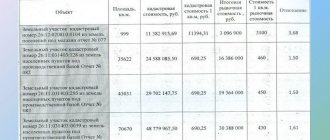Legal advice > Administrative law > Property rights > Privatization of a land plot: all the subtleties of the registration procedure
For a long time now, the question of what privatization of a land plot is has not puzzled anyone. The process of transferring state property to private property, which began back in the 90s. tightly entered our lives. However, it is important for modern citizens to know all the subtleties and features of the procedure for processing documents establishing ownership of a plot of land.
Free land privatization – what is it?
The legislation gives every citizen once in his life to exercise the right to privatize a land plot, that is, to obtain ownership of the plot free of charge.
If such a right has already been used, then in the future it will be possible to obtain ownership of a plot of land only by purchasing it. The main regulations governing the procedure for registering a land plot as a citizen's property are the Land Code of the Russian Federation and the Federal Law of December 21, 2001 No. 178-FZ “On the privatization of state and municipal property.”
A citizen who has privatized a land plot can dispose of it at his own discretion, namely:
- complete a purchase and sale transaction;
- rent it out;
- include in the hereditary mass;
- transfer under a gift agreement.
However, not everyone can obtain land ownership rights for free; the legislation establishes certain conditions for this.
Thus, the following persons have the right to privatize land plots:
- having a plot for free use or under a lease agreement for farming (clause 6, part 2, article 39.10 of the RF Land Code) or for the construction of a residential building (clause 7, part 2, article 39.10 of the RF Land Code) - 5 years after its receipt ;
- belonging to the category of large families (clause 6 of article 39.5 and clause 1 of article 39.19 of the Land Code of the Russian Federation);
- who received ownership of real estate located on land plots as a result of concluding a purchase and sale agreement, by donation, inheritance or in any other way, or actually used it before October 25, 2001;
- having the right of lifelong inheritable ownership or perpetual use.
Reference!
Citizens who have registered ownership of land are obliged to pay land tax, as well as to maintain and maintain it on their own and at their own expense. The resulting site must be used strictly in accordance with its purpose. The law also establishes cases when it is impossible to privatize a land plot:
- the land plot is prohibited for privatization or reassigned for state needs (for example, public land, parks, game reserves, nature reserves) in accordance with Articles 27, 28 of Law No. 178-FZ;
- the site is owned by others.
Refusal to register land ownership must be in writing, indicating the reasons for the refusal, as provided for by federal law.
Collection of necessary documents
To carry out the process of obtaining a plot, you need to collect the following package of documents:
- statement;
- if the site has already been received for free use, an application is required in the form of filing an application for termination of such right;
- have with you a passport of a citizen of the Russian Federation;
- if you, the applicant, are married, you need the consent of your spouse in documentary form;
- paper confirming that you are the legal owner of the land;
- cadastral passport, as well as an extract from the register obtained for this site;
- if the citizen submitting the documents is a representative of a large family, you must provide a document that could confirm this;
- And the last thing you need to have with you when submitting documents is confirmation of a special category of citizens in accordance with Article 39.5 of the Land Code.
Where to start privatizing a land plot
To begin the process of land privatization, you must first make sure that it is subject to registration as a property, and also that the ownership rights to it have not yet been formalized.
You can obtain such information by requesting an extract from the Unified State Register. Any citizen can receive an extract by paying a preliminary state fee.
If there is an opportunity to privatize a plot, then you need to initiate the process by preparing documents. Often you have to look for some papers or get them again.
The exact list may vary depending on the region, so before starting the process it is better to obtain detailed advice from the administration of the area where you live.
The procedure for free privatization
The land privatization procedure consists of the following steps:
- Collection and preparation of the necessary package of documents. This stage is usually the most labor-intensive and time-consuming.
- Sending documents to the organization depending on the owner of the plot indicated in the extract from the Unified State Register of Real Estate: territorial branch of the Federal Property Management Agency - if the land is in federal ownership; municipal administration - if the site belongs to the municipality.
- Land surveying and cadastral registration of the site. This procedure is necessary only if the land was not previously registered properly. The applicant needs to call a cadastral engineer, who will clarify the boundaries of the site, assign an identification number to it, draw up its plan and passport. To register an object for cadastral registration, you must submit a corresponding application to Rosreestr.
- Contacting the administration or the Federal Property Management Agency with an application for privatization.
- Obtaining a decision on privatization or refusal. The decision to refuse privatization can be challenged in court.
- Payment of state duty.
- Registration of property rights in Rosreestr. The decision of the authorized body gives the citizen the right to apply to Rosreestr to enter information about the new owner into the state register.
The process of registering ownership of a land plot is quite lengthy and takes about 2 months from the date of submission of documents to the relevant authority.
Documentation
To obtain land ownership, a citizen will need to prepare and provide a certain package of documents twice:
- to obtain permission for privatization from the authorized body;
- for registration of property rights - in Rosreestr
The following documents must be provided to the first instance:
- passport;
- power of attorney (if a representative acts on behalf of the citizen);
- application for permission to privatize the site;
- a document confirming the right to use the land (for example, a certificate of perpetual use rights, a lease agreement, an order for the allocation of a plot);
- an application requesting to terminate the right to free use of the site (if it was received for use on this basis);
- consent of the spouse, certified by a notary;
- cadastral passport, extract from the Unified State Register or a document confirming the absence of a cadastral number for the plot;
- a document confirming the applicant’s relationship to the category of citizens entitled to participate in privatization.
When accepting documents, a specialist from the authorized body draws up an inventory of them and issues the applicant a receipt of their acceptance. An exhaustive list of documents will depend on the grounds for the application and the purpose of the land used by the citizen. A 30-day period is provided for checking the papers and making a decision.
To register property rights you will need:
- passport;
- application for registration of rights;
- permission from the authorized body for privatization;
- receipt of payment of state duty.
Statement
After preparing the documents, along with the application, they are submitted to the administration at the location of the site or to the branch of the Federal Property Management Agency.
The application form is not specified, but it must contain the following information:
- name of the authority to which the application is sent;
- Full name, address and contact telephone number of the citizen;
- a request for registration of ownership of a land plot, information about it (location, category of plot, type of use, presence of objects on it);
- regulatory justification for the request;
- date and signature of the applicant.
The application can be printed, handwritten, or filled out using a template issued by the authorized body. The main thing is that the information contained in it is correct and reliable.
Based on the results of consideration of the application, a decision is made. A positive decision is the basis for registering ownership of the plot.
Cadastral registration
This stage of land registration must be completed by those citizens whose use of a plot of land has uncertain boundaries or requires clarification. To determine or clarify boundaries, land surveying is carried out. This procedure is carried out by a cadastral engineer, with whom it is necessary to conclude an agreement. The costs of paying for his services are borne by the applicant.
Based on the document issued by the engineer (site plan), you must contact Rosreestr to register the land for cadastral registration.
Price
The exact amount of expenses that the applicant will have to bear at all stages of the privatization procedure will depend on many factors:
- is land surveying and cadastral registration required;
- what documents need to be prepared (some certificates are issued for a fee);
- Does a citizen need to use the services of a lawyer and a notary?
The cost of services of various specialists depends on the region, as well as the size of the site.
An approximate list of costs would be as follows:
- services of a cadastral engineer – from 5,000 to 10,000 rubles;
- notary services – from 1000 to 3000 rubles;
- The state duty for registering property rights is 350 rubles (Article 333.33 of the Tax Code of the Russian Federation).
If any documents are lost, obtaining duplicates may incur additional costs.
Questions and answers
Often, when starting the process of registering land, citizens are faced with a number of unclear and incomprehensible questions, for example, whether it is possible to obtain a plot if the house was built illegally. Some of them are especially often heard at receptions with lawyers.
How long does it take
The timing of registration is purely individual, it all depends on whether all the documents are collected and whether there are any “pitfalls”, for example:
- if all the papers are available, then the application is considered for about two months and then a month is spent on registering the agreement;
- in the absence of a cadastral passport, the period will increase by one month (this is how long the process of producing the document takes);
- if the land is not registered with the cadastral service, then the preparation and execution of papers can last from a year to a year and a half .
How to privatize a plot in SNT? Find out here.
Until what year has housing privatization been extended? Read on.
No land documents
If you cannot find a land allotment act in the BTI archives, then free privatization is impossible for you, only buyout is possible.
When they can refuse
By law, a municipality can refuse privatization only in cases where:
- the site is either withdrawn from circulation or reserved for municipal needs;
- the plot is located on the shore of a reservoir in a water protection zone;
- the land is classified as public space.
The refusal must be issued in writing.
You should be aware that a motivation for refusal is required, corresponding only to the provisions of federal legislation.
The use of local regulations as a reason for refusal is unacceptable.
Privatization through court
The refusal of the authorized body to privatize land must be justified.
If the reasons for the refusal can be eliminated (provide missing documents, correct errors and inaccuracies), then the applicant has the right to apply again after they have been eliminated. But if this is impossible to do, and the citizen believes that the reasons for the refusal are unlawful, then he has the right to appeal such a decision in court. The statement of claim must clearly reflect the circumstances of the case, the reasons for the refusal of the government agency, and references to the provisions of the laws that, in the opinion of the plaintiff, were violated. The application must be drawn up competently, taking into account the legal subtleties of the privatization process and procedural procedures in general.
Considering the responsibility and complexity of such cases, when appealing decisions to refuse privatization, it is best to use the services of a lawyer. A court decision made in favor of the plaintiff will serve as the basis for the authorized body to issue permission to privatize the land.
Cases challenging a decision of a state body are heard by courts of general jurisdiction or arbitration courts. Jurisdiction of the case will depend on the legal status of the applicant (individual or legal entity).
Important points
Privatization is the transfer of state or municipal property for the personal use of an interested citizen or company. As for the reverse process, it is called nationalization or municipalization
. The procedure may be hidden or partial.
In the first case, state property is leased for a long time, taking into account compliance with all legal norms. As for the partial form, within this framework there is a sale of certain parts of the territorial allotment.
The legislation establishes that some land plots have been withdrawn from circulation. This mainly concerns protected areas and areas designated for general use.
Features of land privatization
The procedure and conditions for the free transfer of ownership of a land plot have its own characteristics depending on its type and purpose. However, not all types of plots are subject to privatization. Let us consider the features of the privatization of plots that, in accordance with current legislation, are allowed to be transferred into the ownership of citizens.
Under the garage
The land plot located under the garage can be privatized, but for this it is first necessary to register ownership of the building itself. If the right of ownership of the garage has already been registered, then the owner has the pre-emptive right to privatize the land plot located under it.
However, depending on the type of building, the registration procedure will differ:
- The garage is a separate building - a simplified privatization procedure.
- The garage is part of a garage-building cooperative (GSK). In this case, registration of land ownership is possible under the following conditions:
- shares were paid by all participants of the State Joint Stock Company;
- all garages are registered as property;
- all members of the GSK agree to the privatization of the site;
- A GSK participant was selected to represent the interests of all owners of buildings and a notarized power of attorney was issued in his name.
The land under the cooperative's garages is registered as the shared ownership of all its participants.
If it is impossible to transfer the land plot into the ownership of citizens, then a land lease agreement can be concluded with the members of the cooperative or its chairman.
Apartment building
Article 36 of the Housing Code of the Russian Federation provides for the possibility of registering the land plot on which the apartment building is located, as well as the adjacent territory, as the collective property of the residents of the building. However, the feasibility of such a solution is sometimes questionable.
Despite the fact that land owners will be able to independently decide on the improvement of the territory and other ways of using it permitted by law, they will also have to bear a number of responsibilities:
- pay land tax;
- maintain it independently and at your own expense;
- Do not use for other purposes.
Thus, the owners’ costs for maintaining the site may turn out to be more significant than the expected benefits.
Garden
With regard to garden plots intended for individual housing construction (IHC) or personal subsidiary plots (LPH), Federal Law No. 93 “On the Dacha Amnesty” provides for the possibility of their privatization according to a simplified scheme (there is no need to obtain permission from the municipal authority).
The period of the “dacha amnesty” has been extended until March 1, 2021 and may be extended further. However, you should not delay the registration procedure, since if you miss the deadline established by law, you will only be able to obtain the plot by purchasing it.
Attention! The main condition under which privatization of a garden plot is possible is receipt of the land for use before October 31, 2001 on any legal basis.
Agricultural
The conditions and procedure for transferring ownership of agricultural land are regulated by Federal Law No. 101-FZ dated July 24, 2002. Article 10 of the law establishes that the privatization of such lands is possible through bidding (competition, auction).
Citizens who use it on the right of lifelong inheritable ownership or perpetual use can apply for free privatization of a land plot. Citizens who own buildings located on a plot of land can also register an allotment.
Under a private house
It is possible to register ownership of the land located under the house only if you have documents confirming ownership of the house itself.
In addition, the home owner must meet at least one of the following requirements:
- have a document confirming the right to use the land plot;
- the plot under his house is eligible for the “dacha amnesty” program;
- a citizen belongs to the category of beneficiaries entitled to privatization.
If there are several owners of the house, then they also have the right to participate in the free privatization of the land plot.
Arbitrage practice
Basically, the need to protect rights in court arises at the stage when the authorized body makes a decision to refuse a citizen the privatization of land.
In 2011, land legislation underwent significant changes, so even a refusal to privatize on the grounds of using a previously given right is not always legal. Thus, citizen N. was refused by the administration to privatize a land plot due to the fact that he had previously used such a right. During the consideration of the case, the court found that in 1992, citizen N. was given ownership of part of the plot free of charge; the administration is ready to transfer the second part, which is the subject of the dispute, only through redemption.
However, the court satisfied the claim of citizen N. and declared the refusal illegal, citing the fact that the first free privatization was carried out in 1992, when the new Land Code, providing for a one-time free privatization, did not yet apply to previously arisen legal relations. Thus, the fact of privatization by citizen N. before the adoption of the Land Code has no legal significance and should not be taken into account as a reason for refusal.
What is the price
Although the privatization of the site itself is free of charge, the registration process costs a certain amount. In different regions of the Russian Federation, services vary greatly; approximate prices for registering land ownership are published in the table.
Average prices for paperwork for privatization of a plot of land under a private house:
For free
Free privatization does not mean that the applicant will not have to spend a penny at all.
Some documents and certificates have a cost, for example, to measure a site, the relevant services will charge from five thousand rubles . But a citizen will not pay at all for the fact that his several hundred square meters are registered as private property.
After March 1, 2021, Articles 28 and 56 of the Land Code, regulating the main provisions and relating to the price of registration of ownership of plots, lost force.
This is interesting: Documents after privatization of the apartment in hand
Now the program is carried out completely free of charge, but the privatization of a land plot can be carried out once, just like obtaining ownership of a residential premises.











